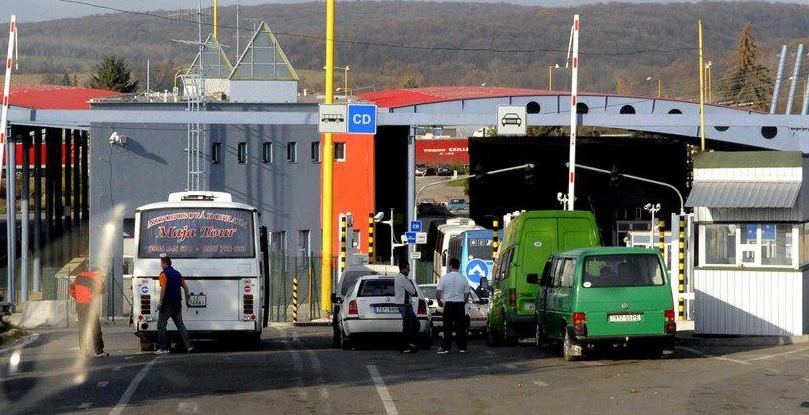
Slovak truckers intend to completely block border crossing point with Ukraine
The Union of Road Hauliers of Slovakia (UNAS) has announced that it is ready to completely block the Vyšné Nemecké-Uzhhorod border crossing point if the situation with the abolition of the permit system for Ukrainian truckers is not resolved
This is mentioned in a corresponding statement.
According to the truckers, they realize that the way to solve the problem is not easy, but in their opinion, the current situation is unacceptable.
"That is why UNAS remains on strike alert, and if there is no other alternative to resolve the situation, UNAS is ready to completely block the border crossing point Vyšné Nemecké-Uzhhorod in both directions," the statement reads.
The carriers thanked the Slovak Minister of Transport Jozef Raž for raising the issue of the abolition of the permit system for Ukrainian carriers and its impact on the road transport of Slovakia in Brussels.
"We would also like to thank him for meeting with UNAS representatives on Thursday, December 7, where we will also discuss the impact of this situation and look for solutions to change it," the statement added.
Earlier, in a comment to Reuters, the head of the Union of Slovak Carriers (UNAS), Stanislav Skala, said that the blockade at the Vyšné Nemecké-Uzhhorod checkpoint was interrupted due to concerns about security and access for emergency services after some truckers waiting in a line that stretched for tens of kilometers threatened to block roads far from the border crossing, which would block access to local villages along the way.
"While we interrupted (the blockade - ed.), some Ukrainian trucks in the column started blocking the road," Skala said.
According to him, the break was also intended to allow the road, which is blocked by trucks for many kilometers, to be cleared.
UNAS also published an open letter calling on the Slovak Prime Minister not to fulfill the agreement with the EU on road transportation in favor of Ukraine. The Union noted that this document released Ukrainian transport companies from responsibility when entering the EU transport market in terms of transportation permits.
"We call on the Prime Minister of the Slovak Republic to strongly protest against this dictatorship by the EU. To stand up for Slovak carriers, because the traffic problem is a problem for the entire EU, and the protection of the Slovak transportation market should be a priority for the Slovak government. At the same time, we urge it to refuse the contract for the transportation of goods, because only a refusal can have a protective effect on the Slovak transport market and tens of thousands of jobs in transport and logistics in Slovakia," the letter says.
On the morning of December 5, it was reported that the Ukrainian-Slovak border was unblocked for truck traffic. Slovak carriers began blocking it on December 1.
Strikes on the border between Poland and Ukraine
Strikes have erupted on the Poland-Ukraine border due to increased competition following the opening of international transportation between Ukraine and EU nations. To address this, the Ministry for Communities, Territories and Infrastructure Development initiated talks with Poland and the European Commission.
Responding to the potential border blockage, the State Border Guard Service provided comments, and Ukraine formally communicated its concerns to Poland regarding the planned strike by Polish carriers at the Ukrainian-Polish border.
On November 6, Polish carriers initiated a strike at the border. The Ministry of Infrastructure noted that no official demands had been submitted by the Polish carriers to Kyiv.
By the evening of November 7, Polish carriers had fully halted the movement of cargo vehicles at two border checkpoints with Ukraine.
Subsequently, it was revealed that trucks are facing up to a 90-hour wait to enter Ukraine.
On November 9, a meeting of government officials and carriers blocking the border with Ukraine took place in Poland, but it concluded without any resolution. Simultaneously, the lines of trucks are growing longer. Consequently, Ukraine has suggested to the Polish authorities the initiation of lanes for empty trucks and is currently awaiting their response.
On November 15, trilateral talks with Poland and the European Commission on unblocking the crossing points took place, but they did not yield any results. Instead, the European Commission may initiate measures against Poland if the authorities do not resolve the issue of carriers blocking checkpoints on the border with Ukraine.
Polish carriers have promised to tighten the blockade on the border with Ukraine. In addition, customs officers have begun to record an increase in truck queues in the Slovak direction.
Ukraine and Poland are preparing claims for damages caused by the blockade of border crossing points due to the rally of Polish carriers. In addition, it has been reported that Polish carriers are not allowing humanitarian aid and dangerous goods to pass through.
According to Volodymyr Balin, vice president of the Association of International Road Carriers, Polish carriers are violating the terms of the strike, which could help to get it called off. At the same time, the Ukrainian economy has already suffered losses of more than €400 million.
Meanwhile, the Polish government has called on Ukraine to cancel the e-queue registration for empty trucks. Poland’s Minister of Agriculture also met with the protesters and offered them a compromise solution.
On December 4, the EU Transport, Telecommunications and Energy Council (TTE) will discuss the situation with the blockade on the Polish-Ukrainian border.
- News














































